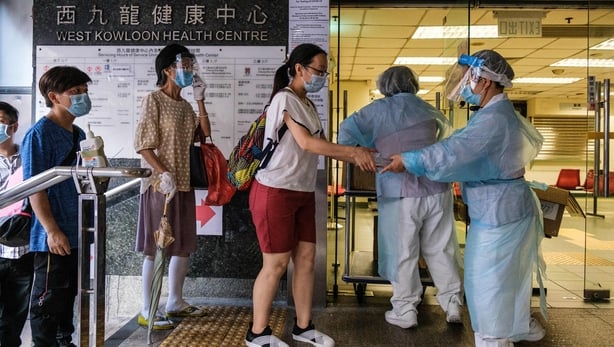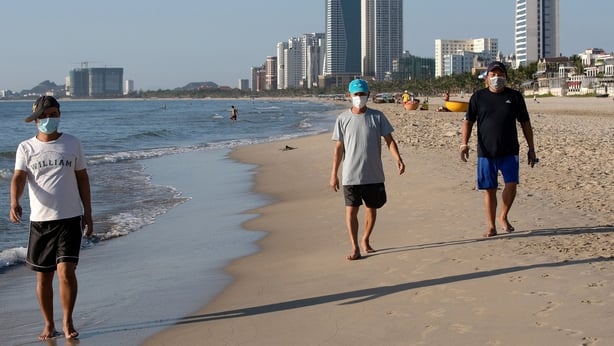The coronavirus pandemic has killed more than 660,787 people worldwide since it surfaced in China late last year, with more than 16.7 million people infected, according to the latest AFP tally.
US deaths from the novel coronavirus surpassed 150,000 today, a number higher than in any other country and nearly a quarter of the world's total.
The US also ranks sixth in deaths per capita, at 4.5 fatalities per 100,000 people.
Only the United Kingdom, Spain, Italy, Peru and Chile have a higher per capita rate, the tally shows, with US deaths making up nearly 23% of the global total.
The increase of 10,000 Covid-19 deaths in 11 days is the fastest in the United States since early June. Florida reported another record increase, with 217 fatalities in the last 24 hours.
The pace of infections has accelerated since the U.S. death toll passed 100,000 on May 27.
The epicentre has also moved, to the South and West from the area around New York, which still has by far the highest toll for one state at more than 32,000.
Meanwhile Louie Gohmert, a Republican lawmaker from Texas who has refused to wear a mask in the past, tested positive for Covid-19 today, raising concerns that other members of Congress may also have been exposed.
Netherlands will not advise public to wear masks
The Dutch government has said it will not advise the public to wear masks to slow the spread of coronavirus, asserting that their effectiveness has not been proven.
The decision was announced by Minister for Medical Care Tamara van Ark after a review by the country's National Institute for Health (RIVM).
The government will instead seek better adherence to social distancing rules after a surge in coronavirus cases in the country this week, Ms Van Ark said at a press conference.
"Because from a medical perspective there is no proven effectiveness of masks, the Cabinet has decided that there will be no national obligation for wearing non-medical masks," she said.
Cases rise in France but second wave denied
The number of new coronavirus infections in France rose by 1,392 today, the highest daily tally in a month and a figure likely to fuel fears of a second wave of the disease despite officials downplaying such a scenario.
The increase took France's total number of confirmed cases to 185,196. In a statement, health authorities said that ,leaving aside the continuous decline of people in ICU units, all Covid-19 indicators showed "an increase of the viral circulation".
Earlier in the day, French Health Minister Olivier Veran urged the country not to drop its guard against the disease, but said it was "not facing a second wave".
There were also 15 new deaths linked to the disease, taking the total to 30,238, a figure higher than the daily average increase of nine seen over the last week.
Hong Kong implements tough coronavirus restrictions
Hong Kong is on the verge of a "large-scale" coronavirus outbreak that could overwhelm hospitals, its leader warned, as authorities implemented their toughest social distancing measures yet.
From today all residents must wear masks when they leave their homes while restaurants can only serve takeaway meals.
No more than two people from different households can gather in public with fines of up to HK$5,000 (€530) for those who breach the new emergency rules.

The latest measures are an attempt to reverse a sudden spike in coronavirus cases that has upended the city's otherwise enviable battle against the deadly disease.
More than 1,000 infections have been confirmed since early July, more than 40% of the total since the virus first hit the city in late January.
New daily infections have been above 100 for the past six days.
"We are on the verge of a large-scale community outbreak, which may lead to a collapse of our hospital system and cost lives, especially of the elderly," Chief Executive Carrie Lam said in a statement.
Vietnam says every city, province now at risk of virus infection
Vietnam, which was virus-free for months, was bracing for another wave of Covid-19 infections after state media reported new cases in Hanoi, Ho Chi Minh City and the Central Highlands linked to a recent outbreak in the central city of Da Nang.
Prime Minister Nguyen Xuan Phuc said the current wave of infections was different to the second wave Vietnam fought in March and every province and city in the Southeast Asian country was at risk.
Thanks to a centralised quarantine programme and an aggressive contact-tracing system, Vietnam had managed to keep its coronavirus tally to just 446 cases, despite sharing a border with China.

With over 95 million people, Vietnam is the most populous country in the world to have recorded no deaths from the virus, and until now no locally transmitted infections had been reported for months.
The government has now suspended all flights to and from Da Nang for 15 days.
At least 30 cases of the novel coronavirus have been detected in or around the city and around 18,000 tourists who had been in Dan Nang have returned to Chi Minh City.
Bars and pubs are to shut and a ban on large gatherings will come into force in Hanoi from midnight as a result of the outbreak in Da Nang.
Prime Minister Phuc said tourist hubs throughout the country had to step up vigilance, and that Da Nang must go under "strict lockdown".

